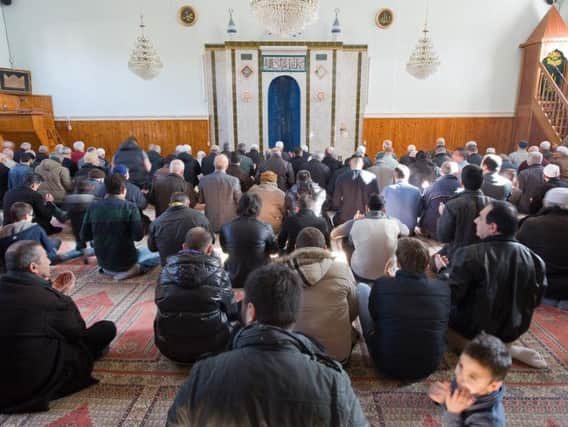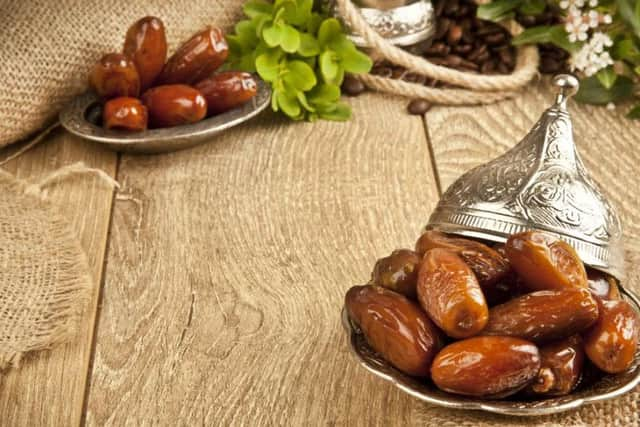Ramadan explained as Muslim fast starts


What is Ramadan?
Ramadan is one of the five pillars of Islam. It marks the time the Prophet Mohammed received the first verses of the Koran. All Muslims are required to fast for daylight hours, for 30 days. It starts today and it will last until around 7 July – right through the longest day of the year. It might sound difficult – and it can be – but it’s also a time of celebration and reflection for many Muslims.


Who’s fasting?
The 1.6 billion Muslims around the world, although there are some exemptions for children and the ill among others. Sadiq Khan, London’s new mayor, will be observing as he beds in to the job – he says he’ll miss coffee the most.
Are you allowed water?
Nope.


Advertisement
Hide AdAdvertisement
Hide AdSo it’s just about banning food and water during daylight hours?
Food, water, smoking, sex and masturbation are all disallowed. Many Muslims also take part in extra prayers nightly, and give to charity beyond their religious obligation. It’s generally a time of religious devotion, and some Muslims report a communal feel: everyone in it together.
But it’s almost the middle of summer, the nights are short
They are, but that’s no excuse for most people. Because of the way the lunar calendar lines up with the Western, solar calendar, Ramadan gets 11 days earlier every year, and it just so happens that this year it has fallen during the part of the year with the longest days and shortest nights.
What about people even further north? How do the Finns do it?
Advertisement
Hide AdAdvertisement
Hide AdThat’s a real problem. In some Scandinavian cities, the sun is down for less than four hours, and for those in the Arctic Circle, it may not go down at all. Classical Arabia, where Mohammed lived, had much less variety, being closer to the equator. Some Egyptian scholars say that if the day is longer than 16 hours, it’s permissible to follow the times of Mecca or the nearest Muslim country – Turkey or Morocco in European cases. But some Muslims, including some in Finland, persevere through the long hours as best they can regardless.
And what’s all this I hear about Vimto?
It’s not caffeinated, it’s sugary and it’s strongly flavoured, so it’s popular at Iftar, the evening meal after a day of fasting. Manchester imam Asad Zaman told Radio 4: “After a day of fasting your stomach has collapsed and your body is really low on energy. Anything sweet is a quick fix in terms of energising your body.” And it’s even more sugary, reportedly, in the Middle East.
What else is on the menu?
Tradition has it that the Prophet Mohammed broke his fast by taking a sip of water, eating some dates and praying, so many Muslims choose to emulate this. However, the table for Iftar varies around the world, with all sorts of traditional, home-cooked food available on those 30 or so nights. Nutritionists recommend slow-burning carbohydrates like rice or pasta to keep observers full, but you can forgive anyone who opts for a quick blasts of flavour and energy after a long day.
What about sports people preparing for the Euros and the Olympics?
Advertisement
Hide AdAdvertisement
Hide AdMany observe the fast. Mo Farah postponed his fast while preparing for the 2012 Olympics, making up the fasting days later in the year. This is something pursued by other British Muslim athletes such as rower Moe Sbihi. Former Tottenham striker Mido, from Egypt, fasted during the season, telling Goal: “When I was in England I was eager to fast all the time and keep praying and also reading Quran in my spare time. I fasted on every day and I don’t think it affected my performance – actually I think I got stronger. I have played many matches on days which I have fasted.”
What’s Eid then?
Eid ul-Fitr is the festival that marks the end of Ramadan. There’s much celebration, prayer and – at last – a daytime meal.
Image here - Muslims at prayer in a mosque
Image here - Dates are a traditional Iftar staple